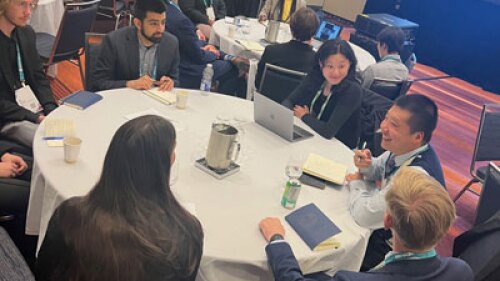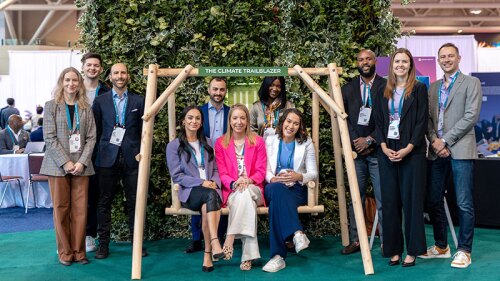The role of entrepreneurs in transforming cities and the impact new technologies are having on how buildings are designed, constructed, and managed were two major topics at the ULI Chinese Mainland’s Winter Meeting, held in Shanghai in December. Now in its fourth year, the meeting drew more than 300 real estate and property professionals and provided an opportunity for China’s nascent product council networks to meet.
“One key strength of this year’s Winter Meeting was the diversity of both domestic and international speakers and audience,” said Albert Chan, director of design and construction at Shui On Land and programming chair of the meeting. “We provided simultaneous translation for all meetings to enable a free flow of dialogue in both Mandarin and English throughout the two days. The other major strength was the exchange of information and ideas from one discipline, technology, to another, real estate. These two strengths made this year’s Winter Meeting very special.”
A technology forum kicked off the meeting with short presentations by emerging entrepreneurs who are offering property owners creative solutions to make their buildings more resource efficient. These startups are also having a major impact on the Chinese economy by employing an increasingly educated workforce.
Among the presenters was John Lai, a 26-year-old entrepreneur originally from Guangdong province who returned home three years ago with a degree in electrical engineering from the University of British Columbia. His company, which employs nearly 100 people, half of whom hold advanced degrees, enables its customers to use smartphone apps to monitor in real time energy use of appliances in their buildings.
A panel discussion on the use of building information management (BIM) followed. BIM is a digital modeling process through which construction teams, architects, and engineers can use the same model to communicate and make progress on a project. BIM is quickly becoming popular in the Chinese Mainland with growing support from the central and local governments. In Shanghai starting in 2020, all public buildings will be required to be designed using BIM. Representatives from the Shanghai Institute of Building Science, SOHO China, and Shui On Land participated in the discussion.
The forum also featured a presentation by a representative of WinSun, a Shanghai-based 3-D printing company that has been developing technologies to build homes using that technology. Mr. Lu, WinSun’s vice president, explained the company’s recent success in printing a three-story home and the benefits of printing versus traditional construction, such as a substantial reductions in materials, labor, and pollution during construction.
Six product council meetings were held, convening experts in hotels and tourism, sustainability, retail-anchored mixed-use development, business parks, housing, and investment. One of the most popular sessions concerned the future development of a suburban township in Pudong, Shanghai, which includes an ancient river town. The township mayor discussed the township government’s plan to preserve the historic river town and develop tourism with existing constraints, such as limited financing options.
“I am proud that we brought together such a diverse group of successful entrepreneurs and experts for stimulating discussions of timely topics affecting the real estate industry,” said Henry Cheng, chair of ULI Chinese Mainland and CEO and executive director of Chongbang Group. “This year’s Winter Meeting greatly helped the participants deepen their understanding of new technologies and social trends and their potential impact on the real estate industry, and also expand their network and build new relationships for future collaboration.”
Ken Rhee is chief executive officer of Huhan Business Advisory, based in Shanghai, and is ULI chief representative for the Chinese Mainland.




